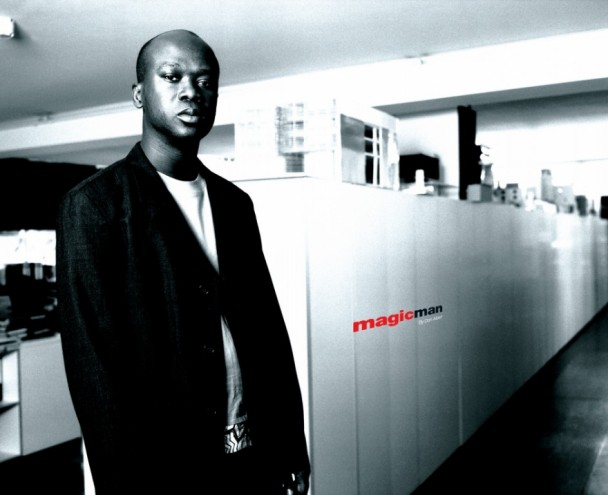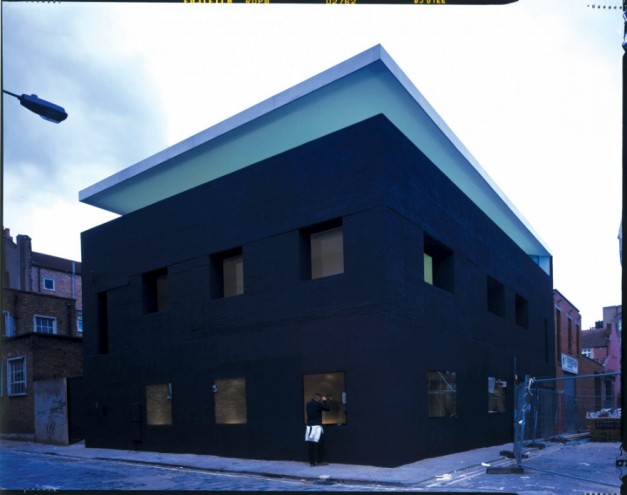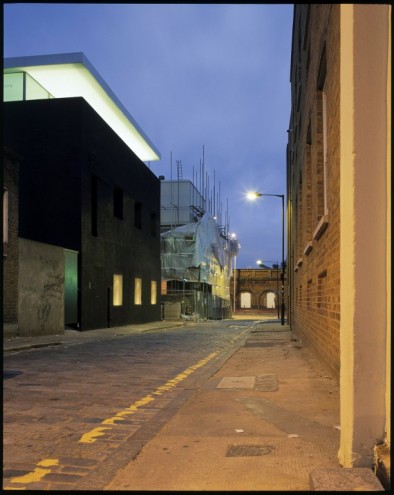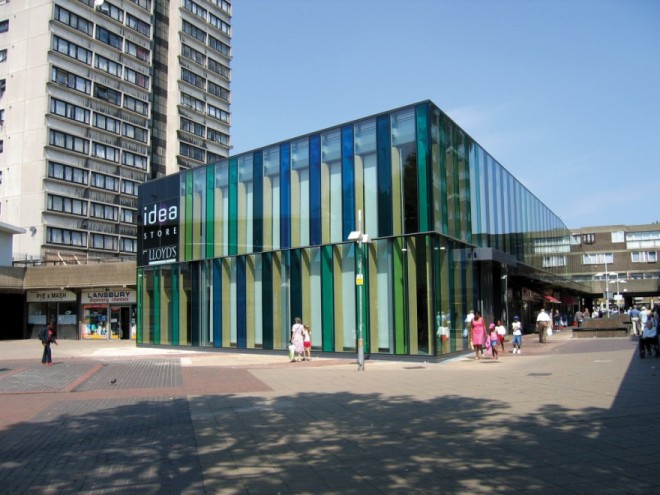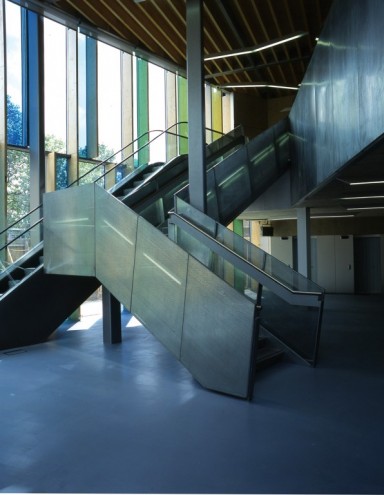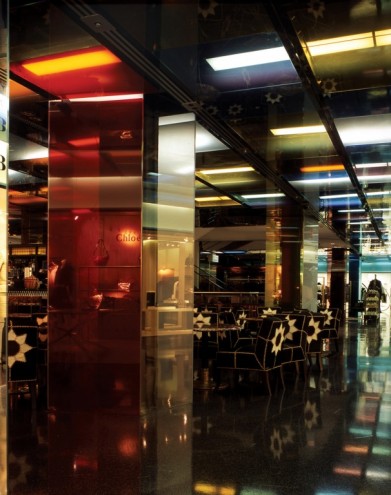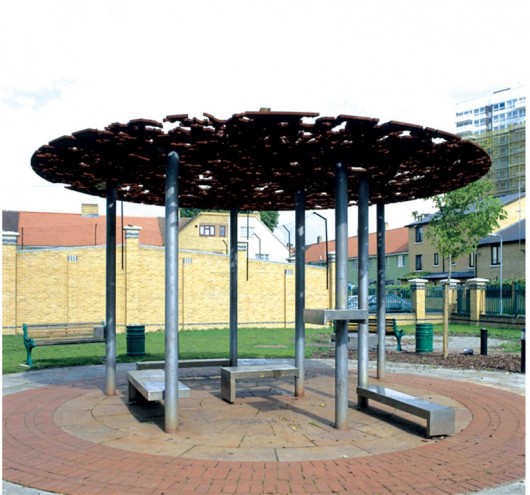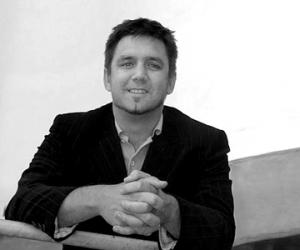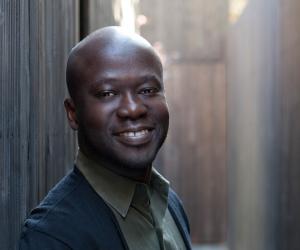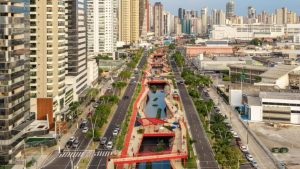First Published in
With an acclaimed practice producing thoughtful creations for the London art and design set for the past five years and, currently, a house prototype in China, an art gallery in Denver and a Nobel Peace Centre in Norway, architect David Adjaye is a poster-boy for a new generation of designer/architects who pluck at the nexus of media and celebrity, yet one who has something passionate and original to offer. Perhaps it's his roots? Soundspacedesign's Don Albert put David on an e-mail high flame to get to the essence of Africa's most talked-about architect since Hassan Fathy.
A brief look at your lecture schedule points to an engaging personality who is only too keen to spread the word, as you have done at Harvard, the AA, the Royal College of Art and Cornell. If there is a pie-chart formula for being a superstar architect - obvious talent aside - what should the proportion of time spent on design, vs management, vs research, vs teaching, vs promotion be?
60% Design / 20% Research / 10% Management / 5% Promotional / 5% Teaching
At 38, you have risen rapidly into the global spotlight through a string of London commissions that have been meritorious through clarity of concept and beautiful execution, rather than for their social function or, typology. This is all the more surprising given the fact that you were born in Tanzania and have grown up in what sounds like a whirlwind of relocations throughout Ghana and North Africa. To what extent has your experience of growing up in Africa informed your art? Would you call yourself "African", and if so, what does that mean for your architecture?
I absolutely call myself African, in growing up in various cultures in Africa and the Middle East I have gained sensitivity to the roles in which different cultures have, the effect they have on our environment and how this is played out both socially and politically. This very much affects the way I tackle my own work and my intellectual references are sourced primarily from African ideas.
With the range of projects you are involved in moving from domestic, into retail, and now into higher profile public spaces, would you expect some degree of specialisation to emerge for your practise, or is this notion outdated commercial pigeonholing?
I don't like the idea of a practice only being able to do one thing, though in this industry it is to a certain degree an inevitability. I have been very lucky in the sense that I have been given the opportunity to work on many different kinds of projects.
You have co-presented two television series of Dreamspaces for the BBC, and recently hosted a BBC Radio program which featured an interview with Oscar Niemeyer. Did you get to meet him? He's my number one hero! Who are your heroes?
Yes I did meet Oscar Niemeyer at his studio in Brazil, an amazing experience. He is definitely one of my hero's along with, Hassan Fathy from Eygpt, Paul Williams (an early 20th-century Californian architect) and Roland Simounet who design the Picasso Museum in Paris.
"Signature" architects of the past were generally allowed a little more time before maturing and "breaking through" into the mainstream of public consciousness, do you feel that things have changed in this regard? At the age of 36 do you feel ready to have your architectural position lionised, or is that position more subject to "fashion" in any event these days and therefore subject to change?
I think that this idea of suddenly getting to do this kind of work at 36 is not really true, up until the early 70's it was common for architects in there early 30's to be winning commissions and getting lots of attention. I think architecture is very slow to build and therefore not faddish in the way that fashion is.
Apart from the obvious logistical issues, is building in different cultural contexts (North America, China, Norway, Ghana, United Kingdom) difficult? Do you believe in "the universal"? Or do you look to amplify the place-specific and cultural when designing abroad?
I believe in the collective human experience but generally I try to find significance, cultural, social and political in the work that I do abroad.
In the Victorian era, English architects like Sir Edwin Lutyens built around the world, albeit with limited means of communication and transportation, and certainly with an agenda of colonial power. Do you believe that the interests you represent in your current foreign commissions are benign? How would you position yourself with respect to your African (and English) roots and the idea that perhaps Ghana needs you?
I consider myself to be a modern African and I very much hope to work in Ghana in a much more civic capacity when the time is right!
I must say, I personally find your work a breath of fresh air compared to the Gothic hangover so typical of "British" architecture, with its obsession with junctions, brackets, connections and structural fluff, that still pervades the Commonwealth, South Africa included. What informs your process or conception about space and form that is so different from the Fosters, Grimshaws and Future Systems of your adopted island? Does it have anything to do with your training and work experience in Portugal?
I think that my experiences working abroad and with different races have been very important in my development as an architect, along with my love of the arts. Although I very much admire the skill of the architects you have mentioned I feel that my path and contribution move me in a different direction, and the African continent is the spring board from which I source the direction in which I work.
In this age of branding and media-rich spaces, which comes first for you in a project, the shaping of pure physical space, or the expression or communication of an idea/message?
For me it is always the shaping of pure physical space, because I believe it has the power to communicate directly with the human experience.
Where is architecture going, philosophically? Is Europe still in the throws of neo-modern "program-as-generator" ideal, or is there something new on the horizon?
It's difficult to tell where architecture is going philosophically, personally I feel this system of the "programme-as-generator" is completely exhausted and there has to be an evaluation of culture, society and politics as generator.
I would agree. And lastly, because the audience (and interviewer) is looking to you as a role model, has there been any time yet for a personal life? Please say yes!
YES!
I look forward to meeting you at the 8th International Design Indaba!
I am very much looking forward to my first visit to this important African city.
About the architect
David Adjaye is recognised as one of the leading young architects of his generation in the UK. He formed a partnership in 1994 and quickly built a reputation as an architect with an artistic vision. The architectural community and the wider public have a high regard for his bespoke design, ingenious use of materials and showcasing light.
He reformed his studio in 2000 as Adjaye/Associates and has gone on to win a number of prestigious commissions. He's presented lectures at Harvard's Graduate School of Design, Architectural Association, the Royal College of Art, Cambridge University, Universidad de Luisdad in Lisbon, Cornell, Yale University, Art Centre College of Design, Los Angeles and Tate Liverpool. The Idea Store (library) was selected by Deyan Sudjic for an exhibition, which highlighted 100 projects that are changing the world at the VIII Venice Biennale of Architecture 2002. The Idea Store, along with residential project-Dirty House was included in the Sao Paulo Bienal, Brazil, in September 2003.
David has co-presented two television series of Dreamspaces for the BBC (six-part series on modern architecture) and recently hosted a BBC Radio program which featured an interview with Oscar Neimeyer.
He will be presenting at The 8th International Design Indaba.

